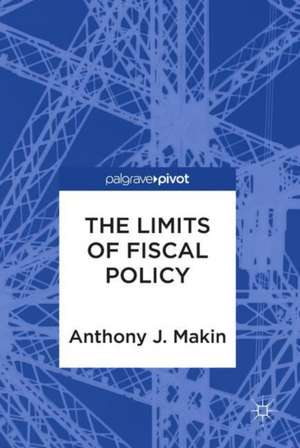The Limits of Fiscal Policy
Autor Anthony J. Makinen Limba Engleză Hardback – 7 iun 2018
This book presents alternative macroeconomic perspectives, primarily open economy, on the limitations of discretionary fiscal policy, with a focus on government spending. Following an overview on the post-crisis Keynesian revival and of the macro-foundations needed for subsequent analysis, different perspectives are expounded that highlight the failings of fiscal activism. These perspectives include extended loanable funds analysis, an expenditure-output related model incorporating money and exchange rates, and a dependent economy framework. The approaches are used to examine investment and net export crowding out effects and their implications for national income, and are then adapted to show the macroeconomic impact of different fiscal consolidation measures, revealing that the nature of fiscal repair is critical. A concluding chapter evaluates the nexus between budgetary policy and confidence, summarises the key failings of fiscal activism, and suggests fiscal policy goals.
The book will appeal to university lecturers and researchers in macroeconomics and economists working in government and the private sector.
Preț: 456.10 lei
Nou
Puncte Express: 684
Preț estimativ în valută:
87.28€ • 90.57$ • 72.95£
87.28€ • 90.57$ • 72.95£
Carte tipărită la comandă
Livrare economică 15-29 martie
Preluare comenzi: 021 569.72.76
Specificații
ISBN-13: 9783319901572
ISBN-10: 3319901575
Pagini: 124
Ilustrații: XIII, 121 p. 34 illus.
Dimensiuni: 148 x 210 x 11 mm
Greutate: 0.45 kg
Ediția:1st ed. 2018
Editura: Springer International Publishing
Colecția Palgrave Pivot
Locul publicării:Cham, Switzerland
ISBN-10: 3319901575
Pagini: 124
Ilustrații: XIII, 121 p. 34 illus.
Dimensiuni: 148 x 210 x 11 mm
Greutate: 0.45 kg
Ediția:1st ed. 2018
Editura: Springer International Publishing
Colecția Palgrave Pivot
Locul publicării:Cham, Switzerland
Cuprins
1. The Keynesian Revival.- 2. Macro-Foundations for Fiscal Analysis.- 3. Budget Deficits, Public Debt and Crowding Out.- 4. Budget Deficits and National Income.- 5. Fiscal Policy, Money and the Exchange Rate.- 6. Fiscal Policy in a Dependent Economy.- 7. Fiscal Consolidation.- 8. Recasting Fiscal Policy.
Notă biografică
Anthony J Makin is Professor of Economics at Griffith University, Australia, and has previously served with the International Monetary Fund and Australian departments of Finance, Foreign Affairs and Trade and The Treasury. He has published widely and is a member of the National Economic Panel of the Economic Society of Australia.
Textul de pe ultima copertă
This book presents alternative macroeconomic perspectives, primarily open economy, on the limitations of discretionary fiscal policy, with a focus on government spending. Following an overview on the post-crisis Keynesian revival and of the macro-foundations needed for subsequent analysis, different perspectives are expounded that highlight the failings of fiscal activism. These perspectives include extended loanable funds analysis, an expenditure-output related model incorporating money and exchange rates, and a dependent economy framework. The approaches are used to examine investment and net export crowding out effects and their implications for national income, and are then adapted to show the macroeconomic impact of different fiscal consolidation measures, revealing that the nature of fiscal repair is critical. A concluding chapter evaluates the nexus between budgetary policy and confidence, summarises the key failings of fiscal activism, and suggests fiscal policy goals.
The book will appeal to university lecturers and researchers in macroeconomics and economists working in government and the private sector.
Caracteristici
Radically re-casts fiscal policy following the limited economic growth after the Global Financial Crisis Gathers together a wide variety of perspectives on possible alternatives to fiscal activism Considers how post GFC experience has parallels with the post-Depression experience with regard to investment uncertainty, and trade protectionism
